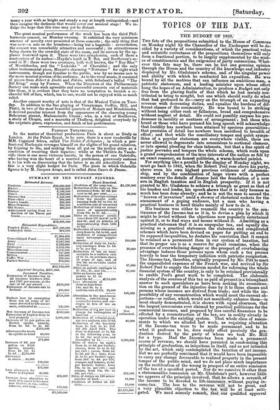The great musioal performance of the week has been the
third Phil- harmonic concert, on Monday evening. It exhibited the very minimum amount of novelty ever presented at these concerts ; the only thing that was new-a solo on the trombone-being but a bagatelle : nevertheless, the concert was remarkably attractive and successful' its attractiveness being shown by the crowded state of the room, and its success by the ap- plause bestowed upon it. There were two symphonies, each of them a masterpiece of its author-Haydn's tenth in:E flat, and Beethoven's se- cond in D : there were two overtures, both well known, the " Ruy Bias" of Mendelssohn, and the " Lodoiska " of Cherubim ; and the only other instrumental piece, Mozart's charming " Nottnrno " for eight wind instruments, though not familiar to the public, was by no means new to the more musical portion of the audience. As to the vocal music, it consisted of pieces from .Robert k Diabk and Fidelio, with Schubert's ballad "The En l King," sung by Formes. When the Directors of the Philharmonic _Society can make such agreeable and successful concerti out of materials like these, it is evident that they have no temptation to furnish a re- cherché bill of fare, which, ten to one, would not be enjoyed with so much relish.
Another concert worthy of note is that of the Musical Union on Tues- day. In addition to the fine playing of Vieuxtemps, Goffrie, Hill, and Matti, in two of the most beautiful quartets of Mozart and Mendelssohn, it derived peculiar interest from the appearance of the charming young Bohemian pianist, Mademoiselle Clause ; who, in a trio of Beethoven, a study of Chopin, and a mazurka of Thalberg, delighted everybody by the exquisite graoe, expression, and finish of her performance.


























 Previous page
Previous page